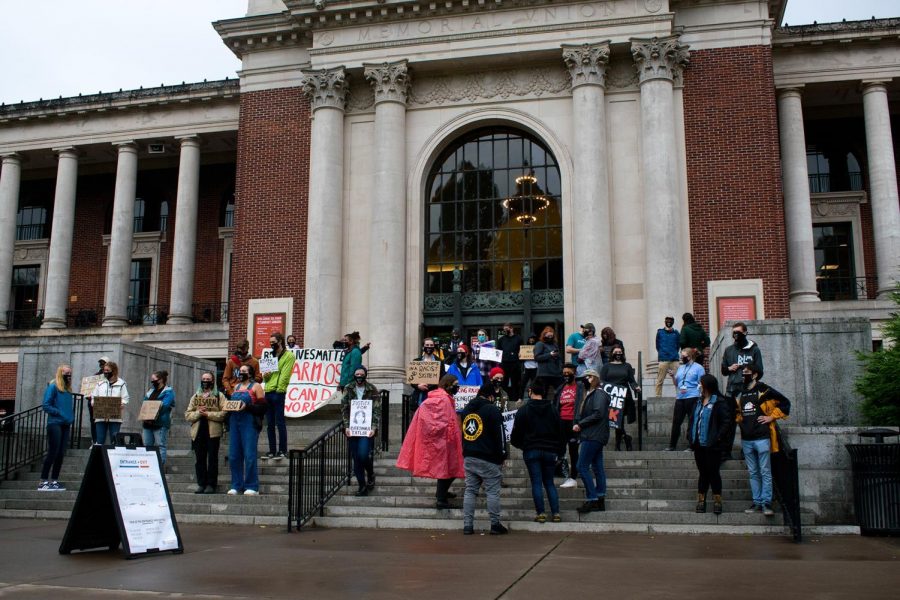Disarm OSU seeks to create informed student body during week one
September 30, 2020
The rain cleared briefly over the Oregon State University Memorial Union steps last Friday during this term’s first Disarm OSU Solidarity Rally. Approximately 40 people gathered to stand in solidarity with the protests calling for justice for Breonna Taylor, a woman whose wrongful death has been the source of protests all over the United States.
On their website, Disarm OSU defines themselves as “a collective of concerned students, faculty, staff and community members of OSU speaking up and acting for social change and public safety.”
Dawson Hughes, a fourth year student studying education and event organizer said “it was mentioned in the last Board of Trustees meeting that maybe we’re some sort of, this wasn’t the exact language, that we were some sort of outside agitators? But in reality we are students: undergraduate, graduate, and then we also have some staff and faculty with us. So we are a group of concerned, I guess, people in Corvallis working to promote anti-racism.”
According to Tali Ilkovitch, a third year student with the We Can Do the Work campaign, “It’s an ongoing process, there’s no “not racist” or “racist.” It’s an ongoing process of working on ourselves, especially as white people, to dismantle the systems that give us privilege and constantly be working on ways to acknowledge the privileges that we have and lift Black voices and lift Black communities through resource allocation, through support, through raising their voices…”
Nat Young, a graduate student studying integrative biology said “I think being actively anti-racist means not only understanding the history of racism and also the current modern context of racism, but trying to educate people about what that means as well, and trying to oppose and fight against systems that enable racism to exist. Making sure that we continue to question systems that allow racism or allow any kind of systematic oppression to exist.”
Attendees wore masks, bearing the logo “WE CAN DO THE WORK,” but what exactly is “the work?”
According to Hughes, “I’d say it’s doing what you’re good at to promote anti-racism, like so for me I really enjoy talking to people. So, for me, running around handing out those masks with our logo was my way of promoting our work to raise awareness for the administration, right? So that they pay attention, listen to our demands, take them seriously but if someone say, really likes graphic design, right? They can actively make anti-racist things for our campaign or something like that.”
Young continued “I think that… the more that we’re vocal about understand[ing] the changes that are happening on campus with campus policing and that we are personally opposed to them, the more that the university administrators, including the Board of Trustees, are held accountable to hearing our concerns.”
”We don’t really have roles, we have kind of a flat hierarchy, so that we’re not kind of reconstructing roles of white supremacy because we don’t want some people having more power than others, so yeah, just team members.” Ilkovitch remarked. Multiple members described the organization as “horizontal,” or non-hierarchical, meaning no members are above one another and everyone pitches in where they can with what they are good at.
More about Disarm OSU and the We Can Do the Work campaign can be found on their website and their Facebook, Instagram and Twitter accounts.
























































































































